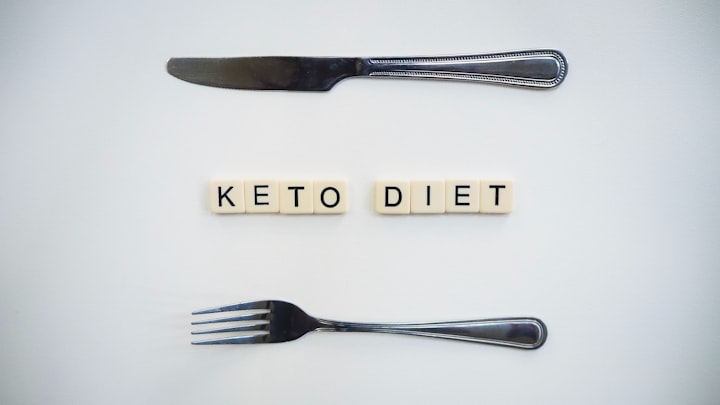keto diet and why is it essential
look at it

The keto diet, also known as the ketogenic diet, has gained popularity in recent years as a way to lose weight and improve overall health. This low-carb, high-fat diet is designed to force the body into a state of ketosis, where it burns fat for fuel instead of carbohydrates. In this blog, we will explore the benefits of the keto diet and why it is essential.
What is the Keto Diet?
The keto diet is a low-carb, high-fat diet that puts the body into a state of ketosis. Ketosis occurs when the body burns fat for fuel instead of carbohydrates. This is achieved by severely limiting carbohydrates and increasing fat intake. When carbohydrate intake is limited, the body starts breaking down fat into molecules called ketones, which are then used for energy.
The Essential Keto Cookbook (Physical) - Free
The keto diet typically consists of 70-75% fat, 20-25% protein, and 5-10% carbohydrates. Foods that are typically consumed on a keto diet include meat, fish, eggs, nuts, seeds, avocados, and low-carbohydrate vegetables.
Why is the Keto Diet Essential?
Weight Loss: One of the main reasons people follow the keto diet is for weight loss. The keto diet has been shown to be an effective way to lose weight, especially for those who have struggled to lose weight with other diets. When the body is in a state of ketosis, it burns fat for fuel instead of carbohydrates, which can lead to significant weight loss.
Improved Energy Levels: Many people report feeling more energized when following the keto diet. When the body is in a state of ketosis, it is burning fat for fuel, which provides a more stable source of energy compared to carbohydrates. This can help prevent energy crashes and improve overall energy levels.
Better Brain Function: The keto diet has been shown to improve brain function and may even be beneficial for those with neurological disorders such as epilepsy. The brain can use ketones for energy, which may improve cognitive function and reduce the risk of age-related cognitive decline.
Improved Blood Sugar Control: The keto diet can be beneficial for those with type 2 diabetes or insulin resistance. When carbohydrate intake is limited, blood sugar levels remain stable, which can help improve insulin sensitivity and reduce the risk of diabetes-related complications.
Reduced Inflammation: Inflammation is a key driver of many chronic diseases, including heart disease, cancer, and Alzheimer's disease. The keto diet has been shown to reduce inflammation, which may help reduce the risk of these diseases.
In conclusion, the keto diet can be an effective way to lose weight, improve energy levels, and reduce the risk of chronic diseases. However, it is essential to speak to a healthcare professional before starting the keto diet, especially if you have any underlying health conditions. Additionally, it is crucial to follow the diet correctly and ensure that you are getting all the necessary nutrients.
here are some additional details about the keto diet:
How Does the Keto Diet Work?
The keto diet works by reducing carbohydrate intake to a minimum and increasing fat intake to a high level. This causes the body to enter a metabolic state called ketosis. When the body is in ketosis, it starts breaking down fat for energy instead of carbohydrates. This leads to weight loss as the body burns stored fat for energy.
Foods to Eat on the Keto Diet
On the keto diet, it's important to focus on high-fat, low-carb foods. Here are some examples of foods to eat:
Meat: beef, pork, chicken, turkey, lamb, and other meats
Fish: salmon, tuna, mackerel, and other fatty fish
Eggs: whole eggs, including the yolk
Dairy: cheese, butter, heavy cream, and other high-fat dairy products
Nuts and Seeds: almonds, macadamia nuts, walnuts, pumpkin seeds, and others
Vegetables: leafy greens, broccoli, cauliflower, zucchini, and other low-carb vegetables
Healthy Fats: olive oil, coconut oil, avocado oil, and other healthy oils
Foods to Avoid on the Keto Diet
To stay in ketosis, it's important to avoid foods that are high in carbohydrates. Here are some examples of foods to avoid:
Grains: bread, pasta, rice, and other grains
Sugars: candy, soda, fruit juice, and other sugary foods
Starchy Vegetables: potatoes, sweet potatoes, corn, and other starchy vegetables
Fruit: high-sugar fruits like bananas, apples, and oranges
Processed Foods: chips, crackers, and other processed foods
Potential Side Effects of the Keto Diet
Some people may experience side effects when starting the keto diet, such as headaches, fatigue, and constipation. These side effects are typically temporary and can be reduced by drinking plenty of water, getting enough electrolytes, and gradually reducing carbohydrate intake.
Is the Keto Diet Right for You?
The keto diet can be a useful tool for weight loss and improving overall health. However, it's important to consult with a healthcare professional before starting the diet, especially if you have any underlying health conditions. Additionally, the keto diet may not be suitable for everyone, and some people may find it difficult to stick to in the long term.





Comments
There are no comments for this story
Be the first to respond and start the conversation.